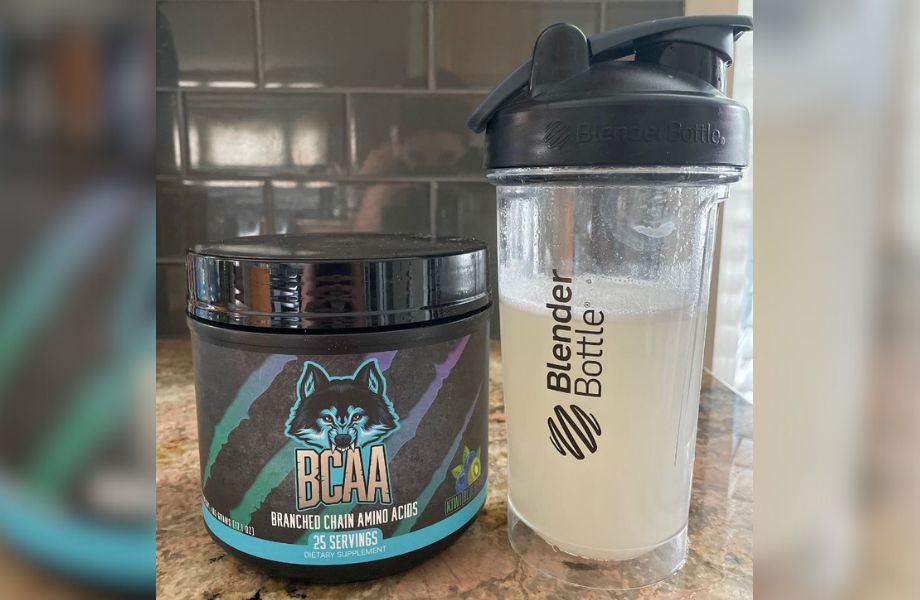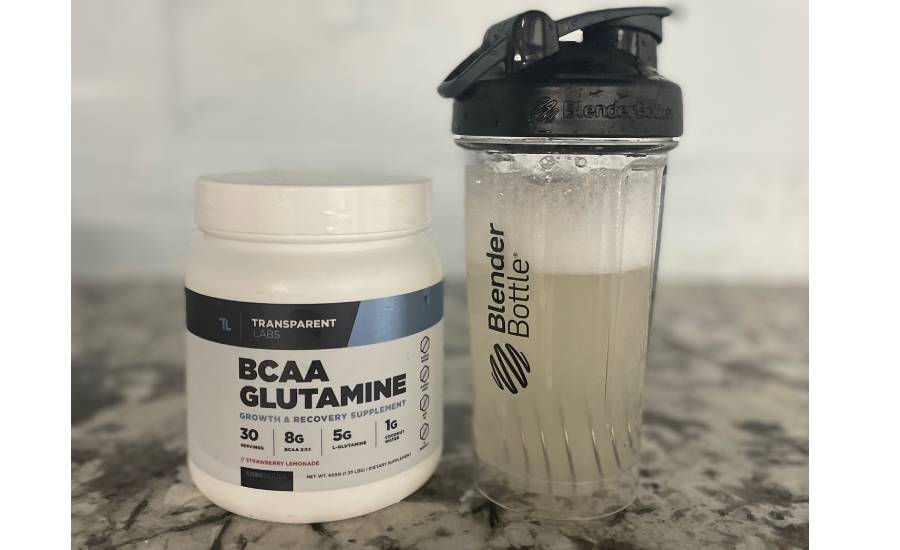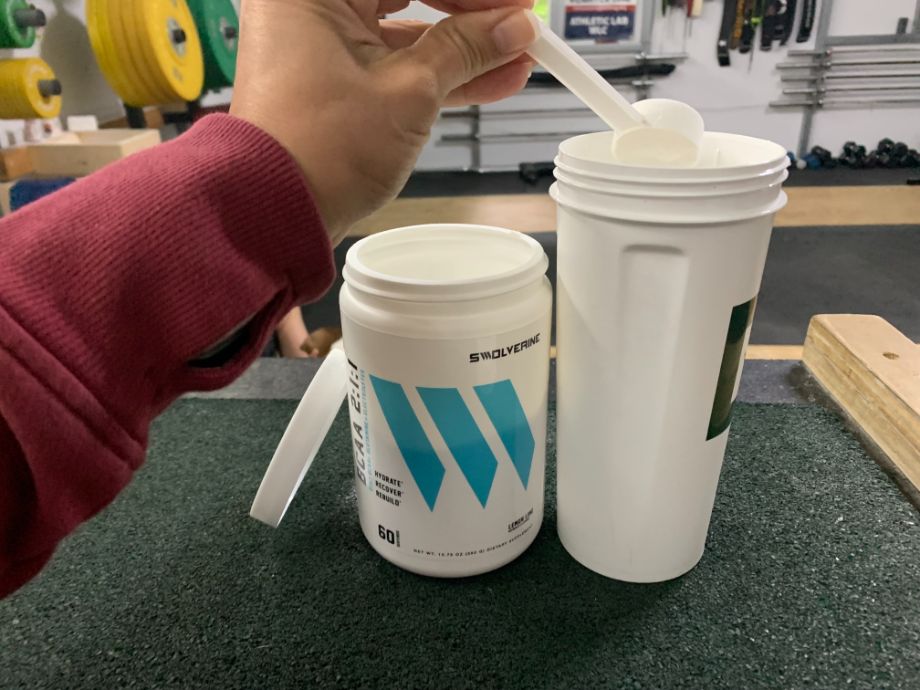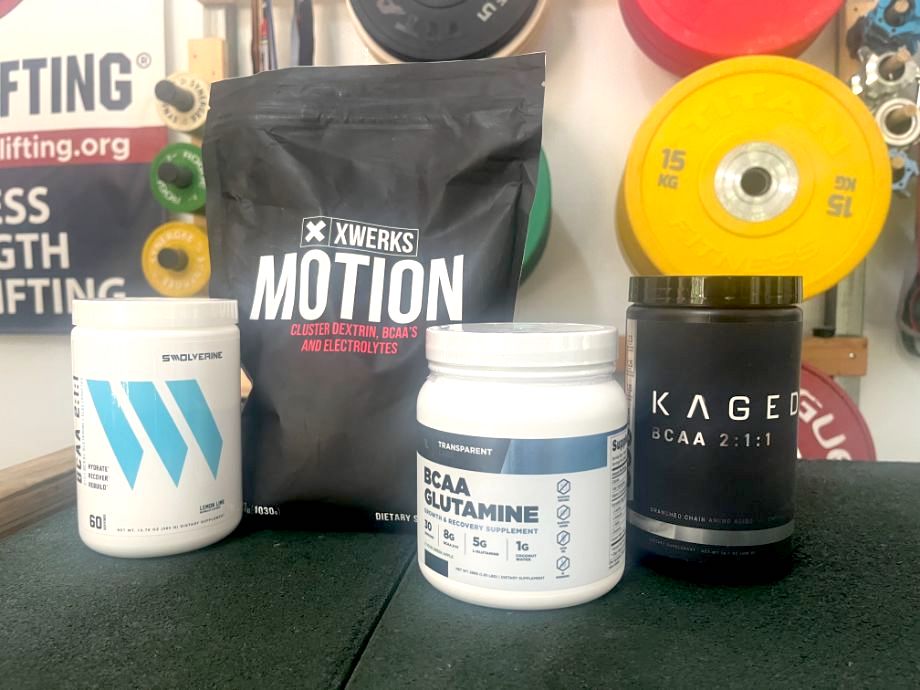Amino acids are the building blocks of muscle—which is something you’ve probably heard to exhaustion from high school health class. To put it in other terms, the body can’t build muscle from nothing, so you have to give it the blocks.
You can get amino acids from BCAA supplements, other protein supplements, or protein sources derived from food. For example, whey protein typically contains a good amount of branched-chain amino acids. Animal products like meat, fish, eggs, and dairy also contain a solid amount.
RELATED: Best BCAA Supplements
However, if you can’t be sure of how many BCAAs you’re getting from other protein sources or do not consume animal products, a BCAA supplement can help you optimize your fitness goals.
Medical disclaimer: This article is intended for educational and informational purposes only. It is not intended as a substitute for medical advice. For health advice, contact a licensed healthcare provider.
What Are BCAAs?
BCAAs, or branched-chain amino acids, are so named simply because of the shape of their chemical structure. They are also three of the nine essential amino acids which means that your body cannot make these amino acids on its own and must get them from food sources.
RELATED: High-Protein Foods
There is no doubt that consuming enough essential amino acids is vital to anyone’s health, but it is also crucial to anyone looking to gain muscle, improve strength, and maintain muscle mass, especially when on a calorie deficit for weight loss.

The branched-chain amino acids, though, have been isolated as the key players in muscle protein synthesis and other factors that influence athletic performance. These amino acids are called leucine, isoleucine and valine. Let’s take a look at them individually.
Leucine
This is what I like to call the big daddy of amino acids, at least when it comes to fitness. This amino acid is the one that “turns on” the metabolic pathway in the body responsible for helping you to build muscle, according to studies1.
It should be noted that leucine works the most effectively to stimulate muscle tissue growth when consumed with a carbohydrate source like maltodextrin or glucose1. To put it simply, consuming some leucine along with some carbs post-workout seems to result in better muscle hypertrophy and strength.
Isoleucine
Research indicates2 that isoleucine doesn’t directly stimulate muscle protein synthesis like leucine does. However, it does alter your blood sugar in order to increase muscle glucose intake. Not only does this help prevent muscle loss, but it can help you to lift heavier or longer with the extra fuel. Both of these functions, therefore, can indirectly help with net muscle gain.
Valine
I’m sorry to report that, compared to its two siblings, valine doesn’t seem to do much for muscle tissue—at least not on its own. However, it does seem to slightly enhance the functions of leucine and isoleucine when the amount of BCAAs is consumed in an appropriate ratio.
How Do BCAAs Work?
Compared to other amino acids, you have the highest concentration of BCAAs in your muscle tissue, which one could assume is where all the hype in the fitness community comes from. Human metabolism research has also shown that BCAAs are metabolized mainly in the muscle, while other amino acids are processed primarily in the liver3.
Because of this, they are believed to enhance exercise performance and stimulate the growth of muscle mass. In the body, amino acids play a variety of roles, some of which are more significant than others in terms of muscle gain:
- Leucine: A crucial BCAA source for muscle protein synthesis, leucine activates a key metabolic pathway for hypertrophy by signaling muscle protein synthesis4. This is why a popular protein supplement for bodybuilders is whey protein powder, which is one of the richest sources of leucine.
- Isoleucine: Improves the efficiency of glucose transport from the blood to the muscles, which may reduce fatigue5 during exercise.
- Valine: Valine works to regulate blood glucose and prevent muscle protein breakdown. This promotes net positive muscle mass gain, therefore indirectly promoting muscle growth
Benefits of BCAAs
Support Muscle Growth
If your goal is muscle growth, adding a dietary supplement like BCAAs can do nothing but help. According to research6, branched-chain amino acids from both BCAA supplements and food sources play a key role in muscle protein synthesis.

This is due to these amino acids, and leucine in particular, having the ability to turn on something called the mTOR pathway. The mTOR pathway7 is a metabolic pathway that is responsible for controlling both muscle protein synthesis and muscle protein breakdown.
Basically, without branched-chain amino acids, this pathway cannot operate optimally to support the gain of muscle mass. So, if you aren’t sure you’re getting enough of these little guys from food sources, having a BCAA supplement is a great idea.
RELATED: Best BCAA for Women
Support Athletic Performance
It has been shown through studies8 in exercise science and sports nutrition that an intake of BCAAs can lower the concentration of serotonin in the body. This is important because an abundance of serotonin can cause muscle fatigue during endurance training.
It is unclear if the benefits are the same in endurance exercises lasting less than an hour. However, if this format of training applies to you, it’s important to recognize that delayed fatigue means you can perform at your peak for longer periods. BCAAs have not been demonstrated to be able to improve strength training performance at this point in time.
Support Fat Loss
A 2016 study9 on 17 male athletes aged 21 to 28 showed that the ones taking BCAA supplements who engage in resistance training were able to maintain lean mass and preserve muscle mass while losing fat mass.
They had two groups of men: one group on branched-chain amino acid supplementation and another who were just having carbohydrates pre-workout. After eight weeks of bodybuilding-style workouts and eating in a calorie deficit, they found that the carbohydrate group lost body fat, but lost muscle mass, as well. The BCAA group, on the other hand, only lost fat.
It’s important to know that no workout supplement can cause weight loss unless you are in a calorie deficit. However, it appears that, if you are in a calorie deficit, BCAA supplements can help you lose some body fat, without losing your skeletal muscle as well.
RELATED: Best BCAA for Men
Reduce Muscle Soreness
Researchers with The Journal of Sports Medicine and Physical Fitness10 found that athletes who took BCAA powder after intensive training experienced 12% less muscle soreness and fatigue than those taking a placebo.
It was hypothesized that the branched-chain amino acids reduced muscle damage associated with intense training. Meaning that your pesky case of delayed onset muscle soreness, also known as DOMS, could fade away sooner when consuming enough BCAAs. That could mean getting in the gym sooner and training longer.
Support Recovery
The current evidence indicates that, if you take BCAAs following an intense exercise session, it is much better for muscle recovery than if you do not. A 2017 study11 suggested that it is due to the ability of BCAAs to reduce the muscle damage and loss of strength associated with power loss after exercise.
Supplement Protein Intake for Vegans
The average vegan athlete consumes fewer calories than their omnivorous counterparts, especially if they do not receive nutrition guidance from dietitians to ensure they receive adequate nutrients.
RELATED: Best Vegan Protein Powder
There are many nutrient deficiencies in plant protein, including a lack of essential amino acids and a lower BCAA content than in protein derived from animals, especially if the goal is to promote anabolism12 in your skeletal muscle.
That is where a good vegan BCAA supplement can come in handy for vegan bodybuilders to ensure that they are consuming the right amount of quality amino acids without compromising their ethical standards.
How to Take BCAAs for Maximum Benefits
Listen up bodybuilders! When compared to isoleucine and valine, the other branched-chain amino acid, leucine, is by far the most important when it comes to muscle growth. Studies have even suggested13 that the total amount of protein consumed does not matter as long as a protein shake or meal contains at least 5 grams of leucine.

Therefore, if your goal is muscle protein synthesis, there doesn’t appear to be an official guideline on the dosage. However, consuming at least 5 grams of leucine after exercise and during muscle recovery appears to be a safe standard to follow14.
So, that’s leucine. But what about the other two branched-chain amino acids? As per the research15, it seems that it is ideal to consume branched chain amino acids in a 2:1:1 ratio to optimally obtain the benefits of BCAAs.
So, if you’re examining a BCAA supplements you’re interested in that supplies 5,000 milligrams of leucine, you want it to also contain 2,500 milligrams of isoleucine and 2,500 milligrams of valine to get the most of your branched-chain amino acid supplementation.
Side Effects and Interactions
When used as directed, supplements containing branched chain amino acids and essential amino acids do not seem to cause significant side effects. Given that these powders and pills do contain predigested, chemical compounds, however, we do recommend paying close attention to the dosing instructions and following them carefully.
It is very important that before adding amino acids to your diet you check with your doctor and/or a registered dietitian if you have any difficulties digesting or processing protein properly, such as in the case of liver disease or certain kidney disorders.
If you are on any prescription medications for diabetes or neurological disorders, ask your physician before adding BCAA supplements into your regimen as they can have dangerous interactions.
RELATED: Best Pre-Workout with BCAAs
It is also recommended that people with diabetes avoid taking BCAAs in general, since the specific effects of BCAAs can alter blood sugar levels in unpredictable ways.
Additionally, this is relevant to people who are less than two weeks out from surgery, because BCAA supplements can affect blood sugar levels during and after the procedure, which can pose a significant danger.
BCAA Benefits for Different Fitness Goals
Though the benefits to exercise performance from BCAAs are widely overhyped, let’s take a closer look at what the science says about what BCAAs can do for fitness goals.
Improving Intake of Key Amino Acids
For those who follow a vegan diet or a generally poor diet that does not include high-quality protein sources, BCAAs can help one get key amino acids to help gain and maintain muscle. For example, protein consumed from plant-based diets is typically lower in amino acids15 than in omnivorous diets.
Furthermore, other conditions that may prevent the consumption of high-quality protein foods such as certain digestive disorders or reduced appetite due to illness or injury, can warrant the use of BCAA supplements.
Muscle Growth
BCAAs, especially leucine, have been shown to help release enzymes16 responsible for hypertrophy. However, no science has proven that BCAAs from supplements are better than the BCAAs you get from food in terms of causing muscle growth. Science more predominantly shows that intact protein from dietary sources is superior to BCAAs from supplements17.
This is likely because evidence consistently shows that people who eat all nine essential amino acids—which are typically present in high-quality protein from animal sources like lean meat, seafood, and eggs—experience far more muscle growth18 than those who only take BCAAs from supplements.
Weight Loss
In some athlete studies, it has been shown that supplementing with BCAAs can help elicit fat loss more effectively19 than soy protein supplements, despite both groups consuming the same number of calories. However, muscle loss was also seen across all subjects.
The results of another widely-cited study20 also found that resistance training combined with BCAA supplementation helped people retain lean muscle mass while reducing body fat. Conversely, the placebo group, which consumed a carbohydrate drink in addition to resistance training, lost fat and muscle.
The problem with this study is they were comparing fat loss between a group taking BCAAs versus a group taking no amino acids whatsoever, so we can’t conclude the BCAAs independently caused the weight loss.
Reducing Fatigue
Several studies have shown that BCAA supplements, taken during physical activity, can reduce exercise fatigue21 by up to 15% compared to those taking a placebo. However, findings showing how BCAA concentrations affect exercise fatigue are inconsistent22, and likewise, many studies show no effect at all.
BCAA Myths
Due to the popularity of BCAA supplements, there are plenty of rumors to go around about their purported benefits. Let’s debunk some of those with some good old-fashioned science.
BCAA Supplements are Critical for Muscle Growth
As mentioned, branched-chain amino acids do play a critical role in hypertrophy. That said, your muscle gain goals would be just fine without these supplements. It would serve you better to focus on adding high-quality protein foods to a balanced diet, as this will provide you with all of the BCAAs and EAAs you need, which will do more for your fitness goals than BCAA supplements alone.

BCAAs Have a Big Impact on Muscle Recovery
In studies investigating BCAAs’ potential effect on delayed onset muscle soreness (DOMS), subjects reported better muscle recovery23 after supplementing with BCAAs compared to a placebo. In contrast to men, women reported less muscle soreness24 when taking BCAAs with carbohydrate sources.
All that said, the magnitude of the effects depends heavily on gender and current protein intake. Even so, BCAAs’ effects on recovery are modest at best.
BCAAs Give You Energy
The cellular energy produced by amino acids is not the same as that produced by glucose from carbohydrates, called ATP. While amino acids are not directly involved in ATP production, they are in energy metabolism. For example, when glycogen stores begin to get low during endurance exercise, studies have shown25 that BCAAs may be able to help generate more ATP. That said, these findings are very divisive in the sports nutrition community, and more research is needed. At the end of the day, though, BCAAs don’t have any appreciable amount of carbs, calories, or caffeine to give your body any energy boost in the traditional sense.
BCAA Benefits: Final Thoughts
Dietitians will always emphasize the importance of knowing that branched-chain amino acids can be derived from a mindful and balanced diet. However, if you want to make sure all of your bases are covered, a workout supplement like BCAAs or even protein powder can help give you some peace of mind that you’re doing all you can to support your body.
If you’re leaning toward supplementing, check out our recommendations on our favorite BCAA supplements. You should be in a calorie deficit and paying attention to your overall protein intake from all sources, respectively, if you are seeking to lose fat or build muscle.
Finally, most of the studies cited around the benefits of BCAAs were done on people who regularly engaged in resistance training. Therefore, if you do not train consistently, it’s likely that BCAAs will not offer you the same benefits. So, what did we learn? Stay up on your training, dial in your nutrition, and use supplements to pick up the slack, when needed.
BCAA Benefits: FAQs
What are the benefits of BCAAs?
The biggest and most meaningful benefit of BCAAs is to supplement a low-protein diet or a diet that’s low in complete proteins. There’s some research that BCAAs could also help with exercise fatigue or recovery.
Is it OK to take BCAAs every day?
In healthy, active individuals who consume BCAAs in the recommended amounts, there have not been any reports or studies indicating that there are serious side effects associated with ingesting BCAAs daily.
When should you drink BCAAs?
You can drink BCAAs at any time of day. However, it may be beneficial to take them post-workout for muscle gain and pre-workout if you are using them for energy, hydration, or to prevent muscle protein breakdown.
Do BCAAs help lose belly fat?
BCAAs can help with the loss of body fat, but only if used in conjunction with a sensible exercise program and a calorie deficit.
Do BCAAs actually work?
BCAAs do have the ability to offer several benefits to performance when taken in the proper amounts.
What is BCAA best for?
If you’re eating a diet that is low in complete proteins or that is low in protein in general, BCAAs can help to supplement your intake.
Are there any negative effects of BCAA?
When taken as directed, there are no significant negative side effects or risks of BCAAs.
Is it better to take BCAA during or after workout?
The studies that have shown beneficial effects of BCAAs on exercise performance seem to indicate they are best taken during a workout.
These statements have not been evaluated by the Food and Drug Administration. This product is not intended to diagnose, treat, cure, or prevent any diseases.
References
- Stark M, Lukaszuk J, Prawitz A, Salacinski A. Protein timing and its effects on muscular hypertrophy and strength in individuals engaged in weight-training. J Int Soc Sports Nutr. 2012;9(1):54. Published 2012 Dec 14. doi:10.1186/1550-2783-9-54
- Zhang S, Zeng X, Ren M, Mao X, Qiao S. Novel metabolic and physiological functions of branched chain amino acids: a review. J Anim Sci Biotechnol. 2017;8:10. Published 2017 Jan 23. doi:10.1186/s40104-016-0139-z
- Shimomura Y, Yamamoto Y, Bajotto G, Sato J, Murakami T, Shimomura N, Kobayashi H, Mawatari K. Nutraceutical effects of branched-chain amino acids on skeletal muscle. J Nutr. 2006 Feb;136(2):529S-532S. doi: 10.1093/jn/136.2.529S. PMID: 16424141.
- Kimball SR, Jefferson LS. Signaling pathways and molecular mechanisms through which branched-chain amino acids mediate translational control of protein synthesis. J Nutr. 2006 Jan;136(1 Suppl):227S-31S. doi: 10.1093/jn/136.1.227S. PMID: 16365087.
- Gualano AB, Bozza T, Lopes De Campos P, Roschel H, Dos Santos Costa A, Luiz Marquezi M, Benatti F, Herbert Lancha Junior A. Branched-chain amino acids supplementation enhances exercise capacity and lipid oxidation during endurance exercise after muscle glycogen depletion. J Sports Med Phys Fitness. 2011 Mar;51(1):82-8. PMID: 21297567.
- Fujita S, Dreyer HC, Drummond MJ, et al. Nutrient signalling in the regulation of human muscle protein synthesis. J Physiol. 2007;582(Pt 2):813-823. doi:10.1113/jphysiol.2007.134593
- Yoon MS. mTOR as a Key Regulator in Maintaining Skeletal Muscle Mass. Front Physiol. 2017;8:788. Published 2017 Oct 17. doi:10.3389/fphys.2017.00788
- Kim DH, Kim SH, Jeong WS, Lee HY. Effect of BCAA intake during endurance exercises on fatigue substances, muscle damage substances, and energy metabolism substances. J Exerc Nutrition Biochem. 2013;17(4):169-180. doi:10.5717/jenb.2013.17.4.169
- Dudgeon WD, Kelley EP, Scheett TP. In a single-blind, matched group design: branched-chain amino acid supplementation and resistance training maintains lean body mass during a caloric restricted diet. J Int Soc Sports Nutr. 2016;13:1. Published 2016 Jan 5. doi:10.1186/s12970-015-0112-9
- Matsumoto K, Koba T, Hamada K, Sakurai M, Higuchi T, Miyata H. Branched-chain amino acid supplementation attenuates muscle soreness, muscle damage and inflammation during an intensive training program. J Sports Med Phys Fitness. 2009;49(4):424-431.
- Rahimi MH, Shab-Bidar S, Mollahosseini M, Djafarian K. Branched-chain amino acid supplementation and exercise-induced muscle damage in exercise recovery: A meta-analysis of randomized clinical trials [published correction appears in Nutrition. 2017 Dec 22;:]. Nutrition. 2017;42:30-36. doi:10.1016/j.nut.2017.05.005
- La Bounty P, Campbell B, Oetken A, Willoughby D. The effects of oral BCAAs and leucine supplementation combined with an acute lower-body resistance exercise on mTOR and 4E-BP1 activation in humans: preliminary findings. J Int Soc Sports Nutr. 2008;5(Suppl 1):P21. Published 2008 Sep 17. doi:10.1186/1550-2783-5-S1-P21
- Phillips SM. The impact of protein quality on the promotion of resistance exercise-induced changes in muscle mass. Nutr Metab (Lond). 2016;13:64. Published 2016 Sep 29. doi:10.1186/s12986-016-0124-8
- Churchward-Venne TA, Breen L, Di Donato DM, et al. Leucine supplementation of a low-protein mixed macronutrient beverage enhances myofibrillar protein synthesis in young men: a double-blind, randomized trial. Am J Clin Nutr. 2014;99(2):276-286. doi:10.3945/ajcn.113.068775
- Phillips SM. Protein requirements and supplementation in strength sports. Nutrition. 2004;20(7-8):689-695. doi:10.1016/j.nut.2004.04.009
- Wolfe RR. Branched-chain amino acids and muscle protein synthesis in humans: myth or reality?. J Int Soc Sports Nutr. 2017;14:30. Published 2017 Aug 22. doi:10.1186/s12970-017-0184-9
- Hulmi JJ, Lockwood CM, Stout JR. Effect of protein/essential amino acids and resistance training on skeletal muscle hypertrophy: A case for whey protein. Nutr Metab (Lond). 2010;7:51. Published 2010 Jun 17. doi:10.1186/1743-7075-7-51
- Church DD, Hirsch KR, Park S, et al. Essential Amino Acids and Protein Synthesis: Insights into Maximizing the Muscle and Whole-Body Response to Feeding. Nutrients. 2020;12(12):3717. Published 2020 Dec 2. doi:10.3390/nu12123717
- Mourier A, Bigard AX, de Kerviler E, Roger B, Legrand H, Guezennec CY. Combined effects of caloric restriction and branched-chain amino acid supplementation on body composition and exercise performance in elite wrestlers. Int J Sports Med. 1997;18(1):47-55. doi:10.1055/s-2007-972594
- Dudgeon WD, Kelley EP, Scheett TP. In a single-blind, matched group design: branched-chain amino acid supplementation and resistance training maintains lean body mass during a caloric restricted diet. J Int Soc Sports Nutr. 2016;13:1. Published 2016 Jan 5. doi:10.1186/s12970-015-0112-9
- Portier H, Chatard JC, Filaire E, Jaunet-Devienne MF, Robert A, Guezennec CY. Effects of branched-chain amino acids supplementation on physiological and psychological performance during an offshore sailing race. Eur J Appl Physiol. 2008;104(5):787-794. doi:10.1007/s00421-008-0832-5
- Blomstrand E, Hassmén P, Ek S, Ekblom B, Newsholme EA. Influence of ingesting a solution of branched-chain amino acids on perceived exertion during exercise. Acta Physiol Scand. 1997;159(1):41-49. doi:10.1046/j.1365-201X.1997.547327000.x
- Shimomura Y, Inaguma A, Watanabe S, et al. Branched-chain amino acid supplementation before squat exercise and delayed-onset muscle soreness. Int J Sport Nutr Exerc Metab. 2010;20(3):236-244. doi:10.1123/ijsnem.20.3.236
- Leahy DT, Pintauro SJ. Branched-chain amino Acid plus glucose supplement reduces exercise-induced delayed onset muscle soreness in college-age females. ISRN Nutr. 2013;2013:921972. Published 2013 Mar 17. doi:10.5402/2013/921972
- Cordeiro LMS, Rabelo PCR, Moraes MM, et al. Physical exercise-induced fatigue: the role of serotonergic and dopaminergic systems. Braz J Med Biol Res. 2017;50(12):e6432. Published 2017 Oct 19. doi:10.1590/1414-431X20176432






